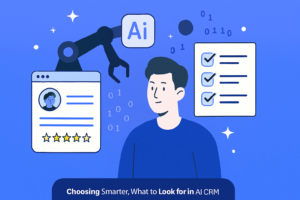CRM Article
Choosing Smarter: What to Look for in an AI-Enabled CRM
SmallBizCRM Staff – November 10th , 2025
Why “Smart” Now Means “AI-Smart”
 The CRM landscape has changed. What was once a tool for contact management has become the brain of the modern business. The newest generation of CRMs doesn’t just organize—it anticipates. These platforms use artificial intelligence to surface insights, predict customer needs, and automate the repetitive tasks that once slowed teams down.
The CRM landscape has changed. What was once a tool for contact management has become the brain of the modern business. The newest generation of CRMs doesn’t just organize—it anticipates. These platforms use artificial intelligence to surface insights, predict customer needs, and automate the repetitive tasks that once slowed teams down.
For small businesses, this shift isn’t about keeping up with big corporations. It’s about working faster, selling smarter, and creating better customer experiences without growing headcount or budget.
So, what should you look for when choosing an AI-enabled CRM?
1. Intelligent Automation That Works for You
AI-enabled CRMs are built to handle the small but time-consuming tasks your team faces daily. From scheduling follow-ups to scoring leads and logging interactions, automation has become the hidden hero of productivity.
 Capsule CRM has been steadily improving its automation features, making it easier for small businesses to create “if-this-then-that” workflows. It allows you to automate lead assignment, task creation, and reminders without writing a single line of code.
Capsule CRM has been steadily improving its automation features, making it easier for small businesses to create “if-this-then-that” workflows. It allows you to automate lead assignment, task creation, and reminders without writing a single line of code.
 Meanwhile, Less Annoying CRM keeps things simple. Its focus is on easy setup and practical automation that small teams can actually use. Instead of overwhelming users with complex dashboards, it quietly takes care of repetitive admin work in the background, letting owners and teams focus on relationships.
Meanwhile, Less Annoying CRM keeps things simple. Its focus is on easy setup and practical automation that small teams can actually use. Instead of overwhelming users with complex dashboards, it quietly takes care of repetitive admin work in the background, letting owners and teams focus on relationships.

The key? Choose automation that simplifies your day rather than complicates it.
2. Predictive Analytics That Drive Smarter Decisions
AI isn’t just about doing things faster; it’s about doing them better. Predictive analytics can spot opportunities your team might miss. It learns from past behavior, analyzes customer interactions, and helps forecast which deals are most likely to close.
For growing businesses, this kind of insight is priceless. It keeps pipelines healthy and helps sales teams prioritize their energy where it matters most.
 Keap, for example, leverages AI-driven analytics to help users understand their customer journey more clearly. Its system can identify buying patterns and send timely nudges, whether that means a follow-up email, an upsell suggestion, or a re-engagement campaign.
Keap, for example, leverages AI-driven analytics to help users understand their customer journey more clearly. Its system can identify buying patterns and send timely nudges, whether that means a follow-up email, an upsell suggestion, or a re-engagement campaign.
When evaluating a CRM, ask, “Can this tool help us make better decisions, not just faster ones?”
3. Seamless Data Integration
A smart CRM doesn’t live in isolation. It integrates seamlessly with your email, calendar, invoicing tools, and marketing apps. The best systems pull customer data from multiple touchpoints into one unified view, allowing you to see every interaction in context.
Capsule’s integrations with tools like Google Workspace, Xero, and Mailchimp give small businesses a complete picture of each customer’s journey from the first email to the final invoice.
This isn’t just convenient. It’s strategic. A connected data ecosystem helps eliminate blind spots and ensures that every decision your team makes is grounded in accurate, real-time information.
When you’re comparing platforms, look for CRMs that make integration effortless rather than a technical challenge.
4. AI That Understands Conversations
CRM systems are getting smarter about how they process language. Modern tools can now analyze customer emails, chat messages, and notes to detect intent, sentiment, and urgency.
While large enterprise CRMs often lead in this space, some smaller, more affordable platforms are catching up quickly. Keap, for instance, uses AI to categorize leads based on engagement patterns, ensuring teams never miss a warm opportunity.
This conversational intelligence doesn’t just save time; it helps you understand what customers are really saying. Whether they’re happy, hesitant, or ready to buy, AI can help your team respond in a way that feels timely and personal.
5. A Learning Curve That Fits Your Team
Even the smartest CRM is only valuable if your team actually uses it. One of the biggest mistakes small businesses make is choosing a system that’s too complex.
That’s where Less Annoying CRM stands out. True to its name, it keeps the interface minimal, clear, and intuitive. The focus is on quick adoption, not endless setup. Teams can start using it effectively within hours—not weeks.
Capsule follows a similar principle, offering clean navigation and straightforward features that scale as your business grows. If your team needs deeper automation later, Capsule can handle that too.
When evaluating an AI-enabled CRM, consider the learning curve. Will it empower your staff or overwhelm them?
6. Affordability That Makes Sense
AI used to come with a hefty price tag, but that’s changing fast. Today, small businesses can access machine-learning tools and workflow automation without enterprise-level costs.
Both Less Annoying CRM and Capsule CRM are proof that you don’t need a six-figure IT budget to get AI-powered functionality. Their plans are affordable, transparent, and built for small teams that need smart tools without financial strain.
Keap, while slightly more advanced in automation and analytics, offers strong value for businesses ready to scale.
Your CRM should be an investment, not an expense. Choose a platform that grows with you—one that saves time, supports your goals, and improves your customer experience month after month.
7. Reliable Support and Training
Adopting AI tools can feel intimidating at first. That’s why reliable support is essential. Look for CRMs that offer hands-on onboarding, quick responses, and practical learning resources.
Less Annoying CRM and Capsule both have reputations for excellent customer service, with real people answering questions and helping users get comfortable fast.
This kind of support ensures your investment pays off from day one and that your team never feels stuck when something new is introduced.
The Smarter Way Forward
Choosing an AI-enabled CRM isn’t just about keeping up with technology trends. It’s about equipping your business to work smarter, close faster, and deliver experiences that keep customers coming back.
Capsule, Less Annoying CRM, and Keap each bring something valuable to the table—whether it’s ease of use, automation power, or data intelligence. The right choice depends on your team’s size, goals, and appetite for AI-driven features.
In the end, the smartest CRM is the one that feels like it’s working alongside you, not against you.